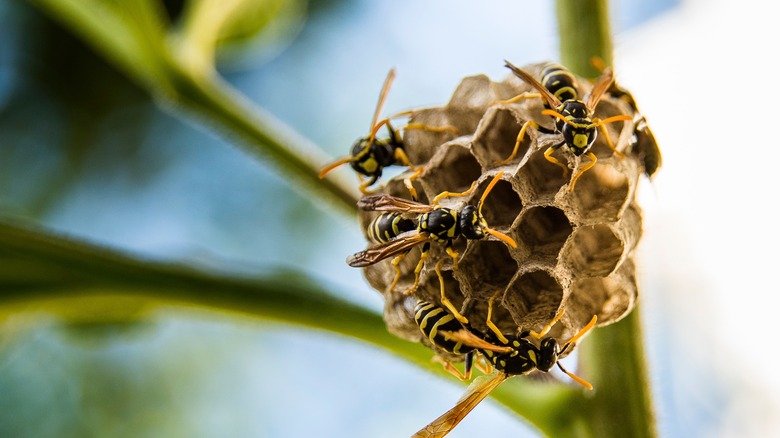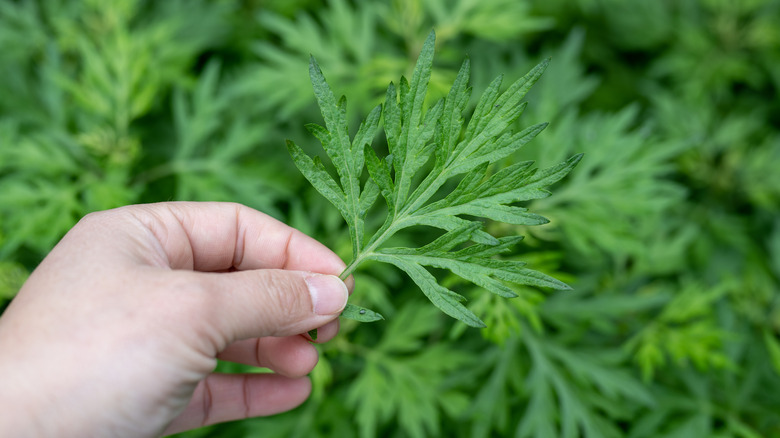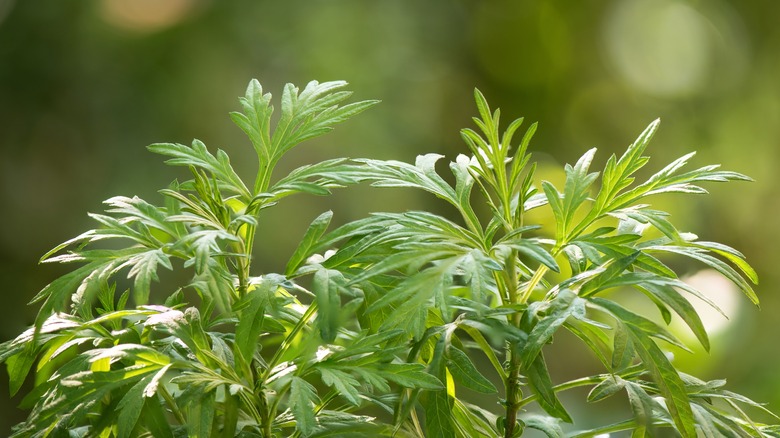Grow This Aromatic Herb To Send Wasps Buzzing Away From Your Yard
Wasps are not everyone's cup of tea. While they serve a vital function in the ecosystem, having them in or around your home and backyard can be stressful and dangerous. Anyone who has ever been stung by a wasp can attest to just how painful and uncomfortable their sting is. Even worse, when they build a nest in a frequently visited area of your backyard or porch, it can feel like you're constantly on the verge of being swarmed or attacked in your own home. No fun.
Luckily, a gorgeous, silvery, culinary, and medicinal aromatic herb is the answer to your waspy nightmares. Wormwood, also known as mugwort, part of the genus Artemisia, is a powerful herb that repels wasps and brings a lush, enchanting, and beautiful element to your garden and medicine cabinet. A significant plant in the history of medicine in Europe and Asia, this ancient beauty with a long history is a must for your garden. Artemisia absinthium contains a molecule used to create absinthe, which has a very bitter taste and smell that works wonders in repelling wasps from your home or yard.
What is wormwood?
Wormwood, mugwort, sagebrush, or cronewort are all common names that refer to multiple species within the genus Artemisia. This powerful herb has been used in traditional medicine and herbalism worldwide for centuries to treat everything from digestion issues to irregular menstrual cycles, fever, cough, and malaria. It is even said to help people lucid dream and connect with the ancestral and astral realms.
Known as a gateway herb in herbalism, this potent plant is a stunner in the garden and an asset in the kitchen and medicine cabinet. With silvery leaves and a tall spiking growth pattern, this is a lovely herb for border planting or adding texture to your garden. You can also use it in the kitchen, like sage or thyme. Lovingly regarded as "crone-wort," or the "Mother of Herbs" in the herbalist community, this plant is said to have an elder feminine spirit that can provide transcendental levels of healing.
Wormwood has a place in many medicine cabinets and gardens. People use all kinds of herbs to keep pests out of the home and garden. When it comes to wasps, wormwood is by far the most effective.
Why is wormwood effective at repelling wasps?
Wormwood is a very bitter-tasting and smelling herb. The compounds that create this bitter taste and smell are repulsive to wasps' strong sense of smell — sending them buzzing in the opposite direction. The bitterness comes from the compound absinthe, which is naturally toxic to insects. Bees and wasps are attracted to flowers and plants based on smells and pheromones, and wormwood gives off a scent that sends out a danger signal to these pesky insects. You can find testimonies across the internet about how effective this plant is at naturally repelling wasps from porches or patios.
You'll want to grow your wormwood in a pot, in your flower garden near your house, or near the area you are trying to ward wasps away from. However, keep in mind that wormwood leaches absinthe into the soil, so do not plant it near any edible plants as it will stunt their growth. However, when placed correctly among plants that it won't damage, its lush, silvery, feathery foliage adds a darling cottage garden vibe to your home. Place it in a sunny, well-draining spot near a particularly waspy area, and watch as the wasps retreat from your garden and never come back!


